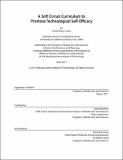A soft circuit curriculum to promote technological self-efficacy
Author(s)
Lovell, Emily Marie
DownloadFull printable version (5.064Mb)
Other Contributors
Massachusetts Institute of Technology. Dept. of Architecture. Program in Media Arts and Sciences.
Advisor
Leah Buechley.
Terms of use
Metadata
Show full item recordAbstract
The development of technological self-efficacy in young people can have a dramatic impact on diversity in the field of computing. Students'self-efficacy and scientific understanding can benefit from engaging in hands-on activities, such as creating soft, electronic textile (e-textile) circuits. There is, however, a notable lack of instructional materials to support such learning experiences. I have developed a workshop facilitation guide which outlines five e-textile activities, accompanied by a collection of low-cost craft and electronic components. The instructional materials target educators, who may facilitate e-textile activities in settings such as science museums, after-school programs, or summer camps. I have assessed the effectiveness and usability of the materials through a short series of workshops, during which I also evaluated their impact on students'technological self-efficacy.
Description
Thesis (S.M.)--Massachusetts Institute of Technology, School of Architecture and Planning, Program in Media Arts and Sciences, 2011. This electronic version was submitted by the student author. The certified thesis is available in the Institute Archives and Special Collections. Cataloged from PDF version of thesis. Includes bibliographical references (p. 35-36).
Date issued
2011Department
Program in Media Arts and Sciences (Massachusetts Institute of Technology)Publisher
Massachusetts Institute of Technology
Keywords
Architecture. Program in Media Arts and Sciences.